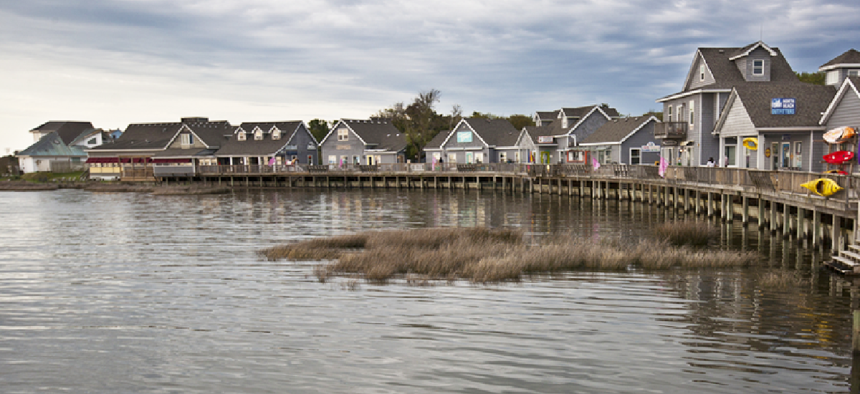Duck goes all in on FirstNet

The small-town North Carolina summer destination spot uses FirstNet for police, fire and surf rescue operations when the summertime population swells to 30,000.
The town of Duck in North Carolina’s famed Outer Banks is in the midst of its busy season. During the summer, it swells from 400 permanent residents to as many as 30,000 visitors. Historically, that’s put a burden on first responders, especially when it comes to wireless communications. But this year, dropped calls and a lack of connectivity were not a concern because the town adopted FirstNet in the spring, said Duck Police Chief John Cueto.
Typically, with 30,000 people competing for cell tower coverage, the police, fire departments and surf rescue units experience dead spots and outages, but that hasn't happened this year, Cueto said.
“Now, I have a system which is basically -- the best way I could describe it -- it’s like plugging in a generator,” Cueto said. With all the town's systems on FirstNet, “should we lose all cellular service in the event of a disaster or critical event, the [satellite cell on light trucks (SatCOLTs)] come in and plug in just like a generator, and I don’t have to resort to using cellphones or different units to dispatch," he said. "They will just power all my systems.”
Duck first responders use FirstNet on a daily basis, not just during disasters. It powers the department’s body-worn and in-car cameras, mobile data terminals and fixed license-plate readers. That last one is particularly important, Cueto said, because there is only one road into and out of town.
Using the readers, he can track the number of cars moving across the town limits and estimate how many tourists are in residence. For instance, on a Saturday during the summer when rental homes empty and repopulate, as many as 60,000 vehicles could go through Duck. About 10% stay, while the rest continue on to the next town.
“If 60,000 go through the south camera system and only 54,000 are going north, then I can deduce that there’s 6,000 cars that stayed within the town,” Cueto said. “If it’s a Suburban with one license plate read, I’ll figure that’s one vehicle, but it’s probably [carrying] at least four people and two dogs. I know that of those 6,000 reads, there’s a good possibility that there I have 24,000 people in town.”
He uses the reader only for counting vehicles, not other information. Although the readers are used daily, they are important in evacuations, too because they give first responders have a better handle on how many people have left town before a hurricane.
FirstNet also helps Duck handle the influx of data during the busy months. The Cradlepoint modems the town uses run on FirstNet and were built to handle fluctuations in download and data speeds. Previously, responders used modems designed for residences and run by a private carrier that wouldn’t adjust capacity or price for low-volume times. As a result, it cost almost $3,000 a month for the data, Cueto said, noting, “that didn’t really work for us.”
Another option through a cable network cut the costs to $99 per month, but the Cradlepoint/FirstNet configuration is half that and carries the FirstNet assurance of priority and preemption, meaning the wireless network will boot private citizens to give bandwidth to responders at high-volume times.
“I can rely on FirstNet, which is a government public-safety agency that’s going to bring in those resources and the deployables and get us back into a safe condition almost immediately,” Cueto said.
The department uses Apple iPhones with FirstNet push-to-talk capabilities, which officers use regularly, he said. “The importance there is in the event of a hurricane, I’m not passing out new devices and having to train and explain and teach these guys how to use them,” Cueto said. “They’re using all these FirstNet equipment and all the technologies on a regular, day-to-day basis.”
In addition to the police, fire department and surf rescue, town administrators also use FirstNet-powered cellphones, putting the whole town on the same communication option, although first responders get the highest level of priority and preemption, while administrators get those to a lesser degree, but more than private citizens.
Next, Cueto is looking to build out the system by getting other partners in the region on FirstNet.
“When other towns come onboard, it just legitimizes the system, makes it stronger and continues to grow it out so it becomes a more viable network,” he said.
NEXT STORY: Nuclear security agency pushing cloud platforms





